UN DESA | DPAD | Development Policy Analysis Division
What's New
28 September 2016

On 28th September 2016, the DPS unit organized a Development Policy Seminar on the topic of “The Internet of Things in transportation and its promise for Sustainable Development”. The seminar was presented by Mr. Viral Chawda (Managing Director - Data & Analytics at KPMG, Dallas) and Ms. Gaya Branderhorst (Director Data & Analytics at KPMG, New York), and it was chaired by Ms. Diana Alarcon (Chief, Development Strategy and Policy Analysis unit (DPAD/DESA)). A brief presentation introduced the concept of Internet of Things (IoT) and its different possible applications in the world today, including support to sustainable development. IoT can, for instance, help in the measurement of the Sustainable Development Goals or even be an integral part of policies for sustainable development. The presenters then discussed specifically the application of IoT in the transportation sector and the potential it holds to support sustainable communities, especially in the urban setting. A lively discussion followed with the audience.
26 September 2016
The Committee for Development Policy will hold a virtual expert group meeting on 29 September 2016 to discuss development strategies that particularly promote the well-being of the worst off, as a part of the Committee's multi-year work programme on the theme of "Leaving No One Behind".
13 September 2016
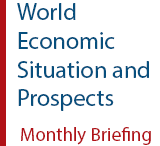
Highlights of the Monthly Briefing on the World Economic Situation and Prospects (WESP), No. 94.
- Global growth prospects restrained by persistent weak labour productivity growth
- Services trade as a potential source of global growth
- Growth moderation in India amid a contraction of investment activity
30 August 2016
Bridging the science-policy interface: using modelling tools to inform integrated approaches for sustainable development

DESA/DPAD in partnership with UNDP launched an initiative to develop a training course aimed at strengthening the science-policy interface to inform sustainable development strategies; raise capacity to establish the inter-linkages across the three dimensions of sustainable development; acquaint participants with the technical tools available; and the implications of an integrated approach for policy decision making. The course is being designed for a wide range of middle to high level government officials, development practitioners and UN staff.
With the purpose of pilot testing the training program, on the week of 22-26 August, DESA and UNDP organised the workshop “Modelling tools-integrated approaches for sustainable development policies” at the UNDP Regional Service Centre for Africa in Addis Ababa. The workshop gathered 30 government officials and UN staff in the field joining from 15countries.
In its current format, the training program covers some of the tools available in DESA’s web platform “Modelling tools for sustainable development policies”. Namely: integrated assessments methodologies, energy systems modelling, energy and electricity for all using geographic information systems, and the analysis of social inclusion through microsimulations. The 5 days hands-on training program was conducted by modelling experts from the Royal Institute of Technology of Sweden (KTH), International Atomic Energy Agency (IAEA), and led by Eduardo Zepeda, recently retired from DESA. Presentations were also made by government officials from Uganda, Bolivia and Nicaragua who have participated in DESA’s capacity development projects in the past. They made important contributions demonstrating the use of modelling tools to inform national policies for sustainable development in the concrete policy context of their own countries.
At the end of the workshop participants expressed the importance of this initiative as a unique effort to support development practitioners to understand the interlinkages and trade-offs between goals, policies and dimensions of sustainable development, and to reflect on these issues under a different scope, with support of modelling tools to illustrate the underpinnings for the development of coherent and integrated policy frameworks.
This pilot workshop has provided valuable insights on areas that need improvement in the design of the final training program. The revised version of the training program will be ready in late October for replication at a larger scale as needed. All course materials, including the learning guide for users, will be available through DESA’s web-platform “Modelling tools for sustainable development policies”.
23 August 2016
Policy modelling capacity building started in Paraguay

On 16-19 August, 2016, UN/DPAD conducted a training workshop for analysts of Paraguay’s Government, in Asuncion, in close collaboration with the Technical Secretariat of Planning. Government analysts began their training in the use of an economy-wide model to develop scenarios delineating implementation strategies of the National Development Plan 2030 and other policies. Messrs. Jose Molinas, Minister of Planning of Paraguay, and Marco V. Sánchez, UN/DPAD staff, held a working meeting and agreed upon scenarios that will be developed as well as next steps (see picture).
8 August 2016

Highlights of the Monthly Briefing on the World Economic Situation and Prospects (WESP), No. 93.
- Brexit triggers policy responses from central banks in both the developed and developing regions
- The weak global economy restrains remittance flows
- China’s GDP growth stabilizes
29 July 2016
The #Electricity4All Python Challenge: an opportunity to engage the public in improving modelling solutions for sustainable development policies
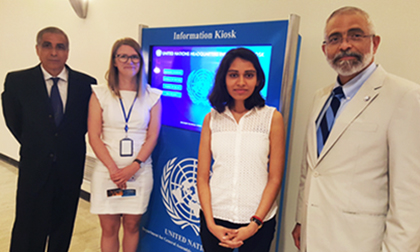 From right to left: Mr. Lenni Montiel, ASG for Economic Development, Ms. Monica Chelliah, winner of the challenge, Ms Taija Soronen, Unite Ideas OICT and Mr. Eduardo Zepeda, IRA- DPAD.
From right to left: Mr. Lenni Montiel, ASG for Economic Development, Ms. Monica Chelliah, winner of the challenge, Ms Taija Soronen, Unite Ideas OICT and Mr. Eduardo Zepeda, IRA- DPAD.
During the HLPF 2016, the Development Policy and Analysis Division/DESA organized an Event on “Modelling Tools for Sustainable Development Policies: A platform to address the economic, social and environmental dimensions of sustainable development”. During the event Mr. Lenni Montiel, ASG for Economic Development of DESA, announced Ms. Monica Chelliah as the winner of the #Electricity4All Python Challenge.
The Challenge, launched by OICT and DESA in collaboration with the Royal Institute of Technology (KTH-Sweden), was an open call for students, programmers and data scientists to improve the Universal Access to Electricity Tool, one of the models that are hosted in DESA’s web platform: “Modelling Tools for Sustainable Development Policies”. The tool, developed by KTH, in collaboration with DESA, provides an assessment of different options to achieve universal access to electricity by 2030 in 44 African countries.
The model uses geospatial data in order to estimate, analyze and visualize the most cost effective electrification option (grid, mini grid & stand-alone) for electrifying presently unserved areas, aiming at ensuring access to affordable, reliable, sustainable and modern energy for all (SDG 7).
The winning submission of Ms. Monica Chelliah, a New York City-based associate software developer, provided an elegant and well-written code in Python, an open source programming language, using the hashing technique for finding nearest neighbors. Her solution managed to reduce the computational time of the model from 50 hours to approximately 3.5 minutes and is currently being used by UN/DESA and KTH colleagues to update and expand the Universal Access to Electricity Tool to other regions. The new developments will be launched later this year in UN/DESA’s web-based platform “Modelling Tools for Sustainable Development Policies”.
The #Electricity4All Python challenge is an example of the innovative contributions different communities of practice, such as developers, programmers and data scientists can provide in our joint efforts to make modelling tools accessible to countries to inform their policy decision making processes for sustainable development.
UN Press release link: http://ow.ly/eJiz302C6IT
19 July 2016
Climate change resilience
 On Wednesday 20 July, the Development Strategy and Policy Analysis Unit organized a side event under the auspices of the High Level Political Forum on Sustainable Development 2016. Under the theme “Climate Change Resilience: An Opportunity for Reducing Inequalities and Ensuring that No One is Left Behind”, the event presented the main messages of the World Economic and Social Survey 2016 (forthcoming) to a well-attended audience composed of representatives from members of NGOs and UN colleagues.
On Wednesday 20 July, the Development Strategy and Policy Analysis Unit organized a side event under the auspices of the High Level Political Forum on Sustainable Development 2016. Under the theme “Climate Change Resilience: An Opportunity for Reducing Inequalities and Ensuring that No One is Left Behind”, the event presented the main messages of the World Economic and Social Survey 2016 (forthcoming) to a well-attended audience composed of representatives from members of NGOs and UN colleagues.
Mr. Pingfan Hong, Director of DPAD, opened the event by introducing the team and the context surrounding the Survey, one of the oldest reports of the United Nations. DSP Chief, Ms. Diana Alarcón, proceeded to present the story line and key messages of the report, highlighting three main policy recommendations: strengthening policy options via integrated assessments, building coherent and flexible policy frameworks, and fostering more cooperation with regards to financing adaptation and the compilation of data and statistics. An interactive discussion with the public followed, with participation of the members of the writing team of the Survey.
18 July 2016
The CDP Secretariat, jointly with OECD, will organize a high-level panel discussion during the United Nations Development Cooperation Forum (Thursday 21 July 2016, New York). The Future Measurement and Monitoring Framework for Development Finance in support of the 2030 Agenda - Total Official Support for Sustainable Development (TOSSD), will aim to advance understanding of the components of a more comprehensive measure of development finance – distinct from and complementary to ODA – to underpin catalytic effect of aid and support the SDGs, and to identify avenues for broad-based consultation with all stakeholders to facilitate international consensus, to ensure that TOSSD will be able to support UN monitoring activities.
11July 2016

Highlights of the Monthly Briefing on the World Economic Situation and Prospects (WESP), No. 92.
- UK vote to leave the EU adds significant uncertainty to the global economy
- Prolonged weak global growth poses a challenge to sustainable development
- India further liberalizes its FDI regime
01 July 2016
DPAD mission to Beijing
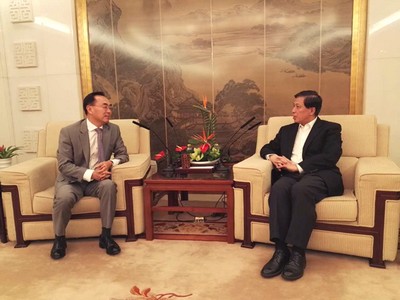 Hamid Rashid and Pingfan Hong took a scoping mission to Beijing on 20-24 June, as part of the DESA capacity development project funded by RPTC on "macroeconomic implications of the Belt and Road Initiative", in cooperation with the State Information Centre of China. The Executive Secretary of ESCAP also sent Hamza Malik to join the mission. The project is intended to promote the Belt and Road Initiative for contributing to the implementation of the 2030 Agenda for Sustainable Development, through a study of macroeconomic implications of the Initiative and the policy options for the countries along the Belt and Road and the world as a whole, in the broad context of the three dimensions of sustainable development.
Hamid Rashid and Pingfan Hong took a scoping mission to Beijing on 20-24 June, as part of the DESA capacity development project funded by RPTC on "macroeconomic implications of the Belt and Road Initiative", in cooperation with the State Information Centre of China. The Executive Secretary of ESCAP also sent Hamza Malik to join the mission. The project is intended to promote the Belt and Road Initiative for contributing to the implementation of the 2030 Agenda for Sustainable Development, through a study of macroeconomic implications of the Initiative and the policy options for the countries along the Belt and Road and the world as a whole, in the broad context of the three dimensions of sustainable development.
During the mission, the team held intensive meetings with a number of government agencies and other institutions, including (1) Ministry of Foreign Affairs (two separate meetings: a team meeting with the Focal Point for the Belt and Road and his team, and Pingfan's meeting with the First Deputy Minister, H.E. Yesui Zhang); (2) National Development and Reform Commission (two separate meetings: one with the Department of the International Cooperation, and another with the Department of the Western Region Development, which is directly responsible for the policies of the Belt and Road); (3) The State Information Centre (a think tank of the National Development and Reform Commission and a long-time partner of the DESA Expert Group on the World Economy (Project LINK)); (4) Beijing Municipal Development and Reform Commissions; (5) China Development Bank; (6) Tsinghua Unigroup Co. (a high tech company); (7) Silk Road Chamber of International Commerce; and (8) UNDP China.
The different perspectives of these meetings deepened the team's understanding of the Belt and Road Initiative. The team shared with these agencies and institutions two main points: (1) the five priority areas for international cooperation as defined in the Belt and Road are closely linked to the 17 Sustainable Development Goals, and the Belt and Road can make an important contribution to the implementation of the 2030 Agenda; (2) the project on "macroeconomic implications of the Belt and Road" can provide a useful macro framework and policy options for the decision-making of the Governments and businesses in the countries along the Belt and Road. Our counterparts in those meetings agreed in principle with these views and made some constructive suggestions.
By the end of the mission, the team reached agreement with the State Information Centre on the work plan for the project.
23 June 2016
Panel discussion on the state of the world economy and the SDGs
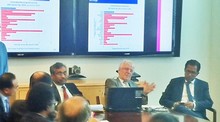 On 14 June, the Development Policy and Analysis Division (DPAD) organized a panel discussion on the state of the world economy and its implications for the 2030 Agenda for Sustainable Development. Mr. Pingfan Hong, Director, DPAD moderated the discussion, which included Mr. Axel Bertuch-Samuels, Special Representative of the International Monetary Fund to the United Nations, Mr. Thangavel Palanivel, Senior Strategic Advisor & Chief Economist, UNDP Regional Bureau for Asia and the Pacific; and Mr. Hamid Rashid, Chief, Global Economic Monitoring (GEM) Unit, DPAD. The panellists highlighted that the current global economic environment poses great challenges to the implementation of the sustainable development agenda. They discussed some of the critical transmission channels through which macroeconomic policies are affecting growth, income distribution and sustainable development and underscored the need for effective policy measures.
On 14 June, the Development Policy and Analysis Division (DPAD) organized a panel discussion on the state of the world economy and its implications for the 2030 Agenda for Sustainable Development. Mr. Pingfan Hong, Director, DPAD moderated the discussion, which included Mr. Axel Bertuch-Samuels, Special Representative of the International Monetary Fund to the United Nations, Mr. Thangavel Palanivel, Senior Strategic Advisor & Chief Economist, UNDP Regional Bureau for Asia and the Pacific; and Mr. Hamid Rashid, Chief, Global Economic Monitoring (GEM) Unit, DPAD. The panellists highlighted that the current global economic environment poses great challenges to the implementation of the sustainable development agenda. They discussed some of the critical transmission channels through which macroeconomic policies are affecting growth, income distribution and sustainable development and underscored the need for effective policy measures.
17 June 2016
Building capacity for sustainable transport pathways in Costa Rica
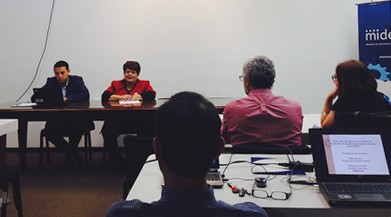 DPAD in close collaboration with the Ministry of Planning, other government institutions in Costa Rica, and the Royal Institute of Technology (KTH), completed a third training workshop on energy systems modelling, in San José, on 6-10 June 2016. As a result of the cumulative training, a number of government experts now possess the skills to use the Long-Range Energy Alternatives Planning (LEAP) system for policy analysis. Their preliminary analysis suggests that aggressive policies for the transport sector will be needed to live up to the expectations of the Seventh National Energy Plan of abating GHG emissions by 2040. These results were presented to the Minister of Planning, Ms. Olga Marta Sanchez Oviedo (in the picture), the Deputy Minister of Environment and Energy, Ms. Vivian Calderon Cordero, and a number of directors and managers from different institutions. Further support for Costa Rica will be aimed at fine-tuning the LEAP model and building scenarios for analysis of targets of the 7th National Energy Plan. Trainees will also acquire stills for better communication of results from models—such as LEAP—to policymakers.
DPAD in close collaboration with the Ministry of Planning, other government institutions in Costa Rica, and the Royal Institute of Technology (KTH), completed a third training workshop on energy systems modelling, in San José, on 6-10 June 2016. As a result of the cumulative training, a number of government experts now possess the skills to use the Long-Range Energy Alternatives Planning (LEAP) system for policy analysis. Their preliminary analysis suggests that aggressive policies for the transport sector will be needed to live up to the expectations of the Seventh National Energy Plan of abating GHG emissions by 2040. These results were presented to the Minister of Planning, Ms. Olga Marta Sanchez Oviedo (in the picture), the Deputy Minister of Environment and Energy, Ms. Vivian Calderon Cordero, and a number of directors and managers from different institutions. Further support for Costa Rica will be aimed at fine-tuning the LEAP model and building scenarios for analysis of targets of the 7th National Energy Plan. Trainees will also acquire stills for better communication of results from models—such as LEAP—to policymakers.
13 June 2016

Highlights of the Monthly Briefing on the World Economic Situation and Prospects (WESP), No. 91.
- World gross product projected to expand by just 2.4 per cent in 2016
- Forthcoming referendum on EU membership has increased financial market volatility in the United Kingdom
- Ongoing fiscal adjustment in Africa, the CIS, Latin America and Western Asia continues to constrain prospects
26 May 2016
Promoting policy dialogue through economy-wide modelling in Bolivia
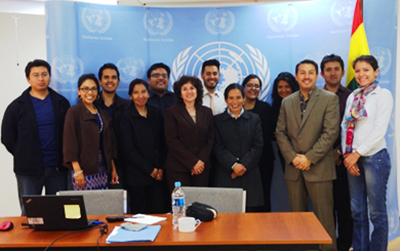 UN/DESA conducted a training workshop in La Paz, Bolivia from 17-20 May to support the elaboration of policy notes through the use of an economy-wide model. A total of 12 government experts, mostly from UDAPE, the Analysis Unit of the Ministry of Development Planning, attended the workshop. The policy notes will report the results of assessing the socio-economic impacts of investments of the National Development Plan (PDES), planned electricity exports, and declining oil prices. The workshop helped to redesign existing simulations and to improve the drafting of analysis of simulation results using language accessible to policymakers. The policy notes will be presented to and discussed with the Cabinet of the Government in July 2016. This activity was conducted under the auspices of capacity development project “Supporting developing countries in their transition from MDGs to broader Sustainable Development Strategies through modelling based policy analysis”.
UN/DESA conducted a training workshop in La Paz, Bolivia from 17-20 May to support the elaboration of policy notes through the use of an economy-wide model. A total of 12 government experts, mostly from UDAPE, the Analysis Unit of the Ministry of Development Planning, attended the workshop. The policy notes will report the results of assessing the socio-economic impacts of investments of the National Development Plan (PDES), planned electricity exports, and declining oil prices. The workshop helped to redesign existing simulations and to improve the drafting of analysis of simulation results using language accessible to policymakers. The policy notes will be presented to and discussed with the Cabinet of the Government in July 2016. This activity was conducted under the auspices of capacity development project “Supporting developing countries in their transition from MDGs to broader Sustainable Development Strategies through modelling based policy analysis”.
25 May 2016
Taxes, Transfers, Inequality and Poverty in the Developing World
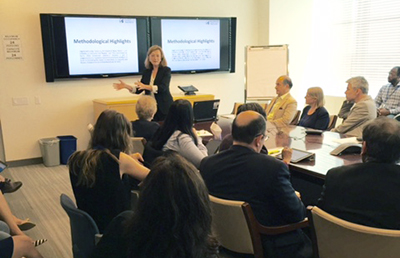
Prof. Nora Lustig, Samuel Z. Stone Professor of Latin American Economics and Director of the Commitment to Equity Institute (CEQI) at Tulane University, conducted a Development Policy Seminar on Taxes, Transfers, Inequality and Poverty in the Developing World today in New York. Her presentation focused on the redistributive impact of fiscal policy in some twenty developing countries. According to Lustig, while fiscal policy practically always reduces inequality, this is not the case with poverty. Indeed, fiscal impoverishment — poor people becoming poorer as a result of net taxes — can be quite significant in low-income countries.
24 May 2016
CDP Secretariat of DPAD will organize a side event during the mid-term review of the Istanbul Programme of Action for LDCs (27 May, Antalya) focusing on the development of a graduation diagnostics toolkit by the CDP Secretariat to assist countries graduating from the LDC category in strengthening capacity for taking stock of their use of LDC specific support, in assessing the specific advantages associated with such support, and preparing for the phasing out of it. The side event will present the toolkit concept and allow for discussions about the functionalities needed to maximize the impact of such system in addressing the uncertainties related to graduation in a systematic way. The side event is jointly organized with the "Fondation pour les Etudes et Recherches sur le Développement International" (Ferdi).
23 May 2016
Technology and Innovation for Sustainable Development
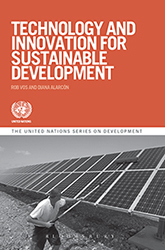 Newly-published Technology and Innovation for Sustainable Development provides a variety of insights about the behavioral and policy changes that would need to accompany the technical transformation needed for sustainable development. The book underlines the challenge of improving and adapting existent technology to the specific local needs of countries. It discusses the experience of countries and the policy options confronted by Governments to expedite the adoption of green technology and to facilitate rapid diffusion and knowledge sharing.
Newly-published Technology and Innovation for Sustainable Development provides a variety of insights about the behavioral and policy changes that would need to accompany the technical transformation needed for sustainable development. The book underlines the challenge of improving and adapting existent technology to the specific local needs of countries. It discusses the experience of countries and the policy options confronted by Governments to expedite the adoption of green technology and to facilitate rapid diffusion and knowledge sharing.
Co-edited by Diana Alarcon, Chief of the Development Strategy and Policy Analysis Unit in DPAD/DESA, and Rob Vos, Director of Agricultural Development Economics at FAO, Technology and Innovation for Sustainable Development takes into account the complexity of inducing technological change in the energy and agricultural sectors. The assessment suggests that this will require major, but doable improvements in national innovation systems and major, but affordable shifts in investment patterns and related macroeconomic adjustments.
The book is available for purchase at UN Publications: https://shop.un.org/
12 May 2016
World Economic Situation and Prospects as of mid-2016
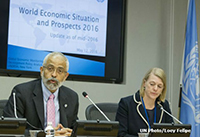 The World Economic Situation and Prospects as of mid-2016 was launched today in New York. World gross product is expected to expand by just 2.4 per cent in 2016, the same rate as in 2015. This marks a significant downward revision of 0.5 percentage points to the United Nations forecasts reported in December 2015. Global economic growth prospects for 2017 also remain well below pre-crisis trends, and a protracted period of slow productivity growth and feeble investment weigh on the longer-term potential of the global economy. Assistant Secretary-General Lenni Montiel added, "The report makes clear that there is no room for complacency if we are to realize a world where every country enjoys sustained, inclusive and sustainable economic growth and decent work for all."
The World Economic Situation and Prospects as of mid-2016 was launched today in New York. World gross product is expected to expand by just 2.4 per cent in 2016, the same rate as in 2015. This marks a significant downward revision of 0.5 percentage points to the United Nations forecasts reported in December 2015. Global economic growth prospects for 2017 also remain well below pre-crisis trends, and a protracted period of slow productivity growth and feeble investment weigh on the longer-term potential of the global economy. Assistant Secretary-General Lenni Montiel added, "The report makes clear that there is no room for complacency if we are to realize a world where every country enjoys sustained, inclusive and sustainable economic growth and decent work for all."
9 May 2016

Highlights of the Monthly Briefing on the World Economic Situation and Prospects (WESP), No. 90.
- Argentina re-enters international capital markets after 15 years
- Deflationary trends remain a concern in euro area and Japan
- GDP growth in China in line with government target, but United States and Republic of Korea fall short of expectations
2 May 2016
Modelling scenarios to inform Kyrgyz Republic's 2030 Strategy
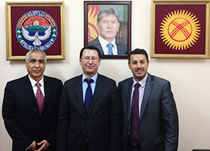 In response to a request from the Office of the President of the Kyrgyz Republic, DPAD staffmembers Marco V. Sánchez and Eduardo Zepeda conducted a scoping mission in Bishkek, Kyrgyzstan on 27-28 April 2016. They met with a number of Government officials and experts to describe UN/DESA’s approach in strengthening national capacities to use modelling tools for sustainable development policies. In an initial phase to be completed by 30 September 2016, DPAD will provide support to update an existing economy-wide model in order to use it for designing the policy scenarios that will inform the 2030 Strategy. There will be further discussions in October 2016 about a second phase of collaboration in three potential areas: (i) the elaboration of the five-year implementation strategy 2018-2022; (ii) capacity building in the use of modelling tools; and (iii) a study addressing the challenges that energy generation, water availability and climate change are posing to the country’s development. Herewith is Mr. Aibek Kadyraliev, Head of the Department of Financial and Economic Analysis and Development Monitoring at the Office of the President, flanked by Mr. Zepeda on the left and Mr. Sánchez on the right.
In response to a request from the Office of the President of the Kyrgyz Republic, DPAD staffmembers Marco V. Sánchez and Eduardo Zepeda conducted a scoping mission in Bishkek, Kyrgyzstan on 27-28 April 2016. They met with a number of Government officials and experts to describe UN/DESA’s approach in strengthening national capacities to use modelling tools for sustainable development policies. In an initial phase to be completed by 30 September 2016, DPAD will provide support to update an existing economy-wide model in order to use it for designing the policy scenarios that will inform the 2030 Strategy. There will be further discussions in October 2016 about a second phase of collaboration in three potential areas: (i) the elaboration of the five-year implementation strategy 2018-2022; (ii) capacity building in the use of modelling tools; and (iii) a study addressing the challenges that energy generation, water availability and climate change are posing to the country’s development. Herewith is Mr. Aibek Kadyraliev, Head of the Department of Financial and Economic Analysis and Development Monitoring at the Office of the President, flanked by Mr. Zepeda on the left and Mr. Sánchez on the right.
13 April 2016
DPAD in international discussion on integrated modelling for sustainable development
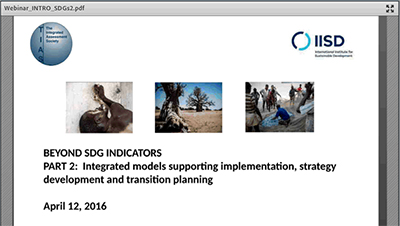
On 12 April, Marco V. Sanchez-Cantillo, Senior Economic Affairs Officer in DPAD, participated as presenter in the webinar series "Beyond SDG Indicators", organized by the Integrated Assessment Society (TIAS) and the International Institute for Sustainable Development. His presentation focused on explaining how DPAD is strengthening national capacities to use modelling tools for sustainable development policies. More information on the webinar series, audiovisual recording and downloadable presentations can be found at http://www.tias-web.info/tias-activities/webinars/#6th
11 April 2016

Highlights of the Monthly Briefing on the World Economic Situation and Prospects (WESP), No. 89.
- Policy space in many developing countries constrained by El Niño
- Further improvement in labour market conditions in Europe and the United States
- Monetary stance eases in the CIS but tightens in Africa
4 April 2016
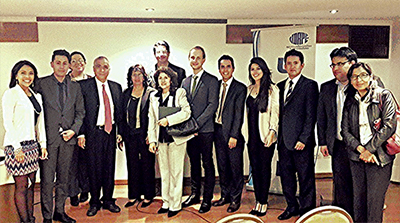
On April 1, DPAD in coordination with UDAPE, the Economic and Social Policy Analysis Unit of the Ministry of Planning and Development in Bolivia, organized the conference “Economy, energy and development” as a forum to communicate results of two years of capacity development projects that have benefitted the country, namely in the strengthening of capacities to build and use modelling tools to inform sustainable development strategies.
Based on the training activities in which government officials acquired skills to design, run, interpret, and communicate results of simulations in economy-wide models, the OSEMOSYS energy systems model, and the LEAP energy balancing-planning framework, the trainees made presentations that addressed both contributions and limitations to key features of Bolivia’s Plan for Economic and Social Development 2016-2020 (PDES).The policy notes that were presented dealt with four main issues: 1) the energy and economy-wide impacts of energy and infrastructure investments; 2) energy efficiency and growth goals; 3) energy trade, fossil fuel reserves, and electricity generation; and 4). climate change. Each of the policy notes was prepared collaboratively with cross-ministerial teams.
As a continuation of this effort, DPAD and UDAPE will select six notes to be presented in three cabinet meetings starting on 11 May 2016, and selected policy notes will form part of the chapters in Bolivia’s first energy plan. Furthermore, capacity development activities in the use of modelling tools will continue with the implementation of Development Account project ROA 260 in which the current economy-wide model will be extended to include climate change issues, poverty and human development.
22 March 2016

Helping strengthen national capacities in Bolivia
In the Symposium on the Promotion of an Inclusive and Accountable Public Administration for Sustainable Development held in Cochabamba, Bolivia from 16-17 March, Ms. Mirna Mariscal, Deputy Director of Unidad de Análisis de Políticas Sociales y Económicas (UDAPE), made a presentation on the impact of capacity development shaping policies in Bolivia. Since 2006, UDAPE—the Economic and Social Policy Analysis Unit in the Ministry of Planning and Development in Bolivia—has benefitted from several development projects organized by DESA/DPAD to strengthen technical capacities in the areas of economy-wide modelling and energy systems, as well as integrated policy analysis in the areas of climate change, land use, energy and water.
Ms. Mariscal elaborated on the importance of building national capacities to address the policy issues that are relevant to the Government of Bolivia. She also highlighted the role of strengthened national capacities to improve the inter-ministerial coordination required for the successful implementation of the 2030 Agenda for Sustainable Development.
Most recently, enhanced technical capacities in the use of economy-wide and energy models as provided by DESA/DPAD were crucial in formulating the Intended Nationally Determined Contribution (INDC) presented by Bolivia at the United Nations Conference on Climate Change (COP 21) in Paris in December 2015.
21 March 2016
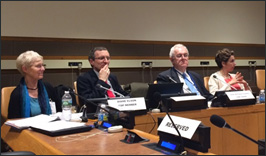
Expanding productive capacity for achieving the SDGs
A panel discussion on expanding productive capacity for achieving the Sustainable Development Goals, a side event to the 18th Committee for Development Policy (CDP) plenary session, was held at UN Headquarters on 16 March, featuring CDP members, Prof. Diane Elson, Prof. Stephan Klasen, and Prof. Keith Nurse. The discussion was moderated by the CDP Chair, Prof. José Antonio Ocampo.
“The international community is now focusing its attention on implementing the ambitious goals and targets in the 2030 Sustainable Development Agenda. A critical element for ensuring that no country is left behind in the efforts to achieve the SDGs is to expand productive capacities in least developed countries”, Prof. Ocampo explained. Panellists focused on the contribution of international support measures for least developed countries (LDCs), such as preferential market access and aid for trade for productive capacity building on LDCs. They also stressed the importance of having an integrated policy approach including investing in human capacities and social protection, promoting environmental sustainability and adopting growth-oriented macroeconomic and financial policies.
17 March 2016
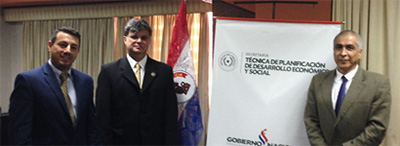
UN DESA
Towards building modelling capacity in Paraguay
In response to a request from the Government of Paraguay to build modelling capacities for the implementation of the country's national sustainable development strategy 2030, Senior Economic Affairs Officers from DPAD travelled to Asuncion, Paraguay from 9-10 March 2016, to lay out a roadmap for the capacity building initiative. With economic modelling at the core, the mission was also very successful in identifying a concrete need to strengthen capacity in energy systems modelling to support energy planning. The Planning Secretariat, headed by Minister of Planning, Mr. Jose Molinas (center), was very pleased to initiate the capacity development activities in Paraguay, with primary training workshops scheduled for May/June.
14 March 2016

Highlights of the Monthly Briefing on the World Economic Situation and Prospects (WESP), No. 88.
- Is the zero lower bound no longer a hard constraint?
- EU-wide strategy to address refugee crisis remains elusive
- Drought leads to a spike in food prices in Africa and Latin America
7 March 2016
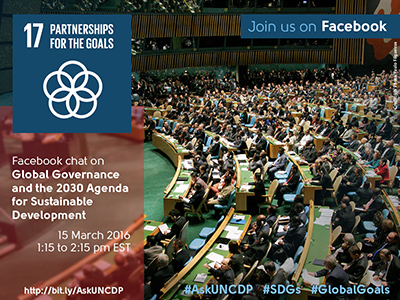
UN DESA
#AskUNCDP: Global Governance and the 2030 Agenda for Sustainable Development
On 15 March from 1:15 pm to 2:15 pm EST, join Committee for Development Policy members Prof. José Antonio Alonso (Complutense University, Spain), Prof. José Antonio Ocampo (Columbia University, New York) and Prof. Keun Lee (Seoul National University, Republic of Korea) on a live Facebook chat on global governance and the 2030 Agenda for Sustainable Development. Post your questions at http://bit.ly/AskUNCDP or on Twitter using any of the following hashtags: #AskUNCDP #SDGs #GlobalGoals
18 February 2016
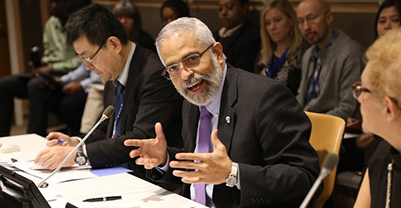
UN DESA
Modelling Tools on Sustainable Development
A workshop on Modelling Tools for Sustainable Development Policies was held at UN Headquarters today featuring the launch of a new web-based platform to strengthen countries’ capacities to formulate their national strategies for sustainable development. “The website is a platform to make the modelling tools used in our capacity development projects widely available,” ASG for Economic Development Lenni Montiel explained. “By doing this we are aiming at enhancing collective capacities to continue providing support to UN Member States in assessing integrated policy options in line with the Agenda 2030 framework.”
10 February 2016
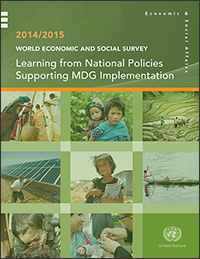
World Economic and Social Survey 2014/2015
The World Economic and Social Survey 2014/2015: Learning from National Policies Supporting MDG Implementation reviews economic, social and environmental policies implemented at the national level and the institutional aspects that enabled them, bringing about significant progress towards achieving the Millennium Development Goals. The Survey draws a set of useful policy lessons that Member States will find helpful in formulating strategies and policies for implementation of the 2030 Agenda for Sustainable Development, including the Sustainable Development Goals.
8 February 2016

Highlights of the Monthly Briefing on the World Economic Situation and Prospects (WESP), No. 87.
- Commodity price rout dampens regional growth prospects
- China emphasized the need to improve productivity through policies on the supply side of the economy
- Bank of Japan adopts a negative interest rate
5 February 2016

Prospects of Graduation from the LDC Category
The Committee for Development Policy (CDP) Secretariat is organizing an event on Meeting the Istanbul Programme of Action (IPoA) Targets: Prospects of Graduation from the Least Developed Countries (LDCs) Category on Thursday, 11 February at 1:15 pm in Conference Room 11. Roland Mollerus and Matthias Bruckner will explain the unique role of the CDP in identifying LDCs and will take stock of the progress towards the IPoA target of enabling half the LDCs to meet the graduation criteria by 2020. An interactive discussion with participants will clarify possible questions on the graduation criteria and the triennial reviews.
1 February 2016
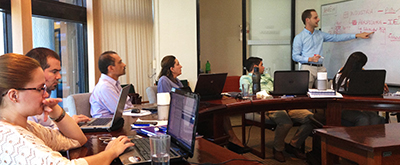
Continued efforts in building energy planning capacity in Costa Rica
The process of supporting countries in their transition from MDG-based development strategies to broader sustainable development strategies through modelling-based policy analyses has continued in Costa Rica with the second training in the use of the Long-Range Energy Alternatives Planning (LEAP). The training was organized in San Jose, on 25-29 of January, at the premises of the Ministry of Planning and Economic Policy. It targeted government experts from institutions doing energy planning.
As a result of the training, participants now possess the skills to use the LEAP system with Costa Rican data. The workshop has paved the way for trainees to initiate simulations whose results will support the preparation of policy notes, covering a number of energy-related issues, especially transport.
27 January 2016
Report on the Project LINK Meeting
A UN/DESA Expert Group Meeting on the World Economy, also known as the Project LINK Meeting, was held in New York on 21-23 October 2015. A wide range of experts from academia, economic research institutions and international economic organizations as well as United Nations colleagues from the regional commissions participated in the meeting to discuss the current state of the world economy, regional outlook, world commodity markets and global modelling and econometrics.
25 January 2016
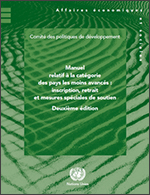
Handbook on the LDC Category, French
The second edition of the Handbook on the Least Developed Country Category: Inclusion, Graduation and Special Support Measures is now available in French. The LDC Handbook provides comprehensive information on the least developed country (LDC) category, including a description of procedures and methodologies used in the identification of these countries, and the support measures associated with it.
20 January 2016
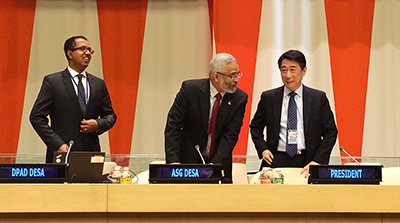
World Economic Situation and Prospects 2016
The World Economic Situation and Prospects 2016, UN/DESA’s flagship report on the state of the world economy, was launched today in New York. The report projects a modest improvement for the world economy in 2016/17 as a number of cyclical and structural headwinds persist. Global growth is estimated at a mere 2.4 per cent in 2015 and is forecast to grow by 2.9 per cent in 2016 and 3.2 per cent in 2017.
In his address to the ECOSOC Bureau, ASG Lenni Montiel said, “The WESP 2016 underscores that global growth faltered last year and only a very modest improvement is expected in 2016 and 2017. Clearly, the projected growth of the global economy will impact efforts to pursue sustainable development in all three areas - economic, social and environmental… Given the weak growth prospects, we need to step up our efforts to boost growth and job creation around the world. Let us not forget that the fastest progress towards achieving the MDGs was during 1995-2007, when the world economy registered robust and balanced growth.”
Notwithstanding weak growth prospects, the WESP 2016 highlights some positive trends in environmental sustainability. Global energy-related carbon emissions experienced no growth in 2014 for the first time in 20 years, with the exception of 2009 when the global economy contracted, suggesting that a delinking of economic growth and carbon emission growth is possible with appropriate policies and adequate investment.
11 January 2016

Highlights of the Monthly Briefing on the World Economic Situation and Prospects (WESP), No. 86.
- Limited global financial market reaction to Fed's interest rate move
- IMF includes Chinese renminbi in the SDR basket
- Monetary tightening in Western Asia and Latin America in response to Fed's first rate hike in seven years

